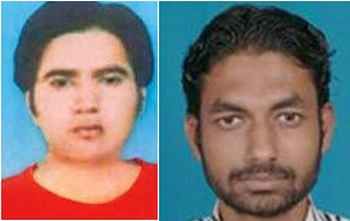 A tug of war was witnessed in a Delhi court between the National Investigation Agency and the Special Cell of Delhi Police for seeking the custody of top Indian Mujahideen operatives Tehseen Akhtar and Zia-ur-Rehman alias Waqas.
A tug of war was witnessed in a Delhi court between the National Investigation Agency and the Special Cell of Delhi Police for seeking the custody of top Indian Mujahideen operatives Tehseen Akhtar and Zia-ur-Rehman alias Waqas.
The special cell sought 15 days police custody of Akhtar alias Monu, Waqas and three other suspected IM operatives in connection with an illegal arms factory case but the National Investigation Agency countered their submissions, saying they need to take custody of Akhtar and Waqas in the 2013 Hyderabad's Dilsukhnagar blasts case.
As soon as the proceeding began before Additional Sessions Judge Daya Prakash, the NIA told the court that being a federal central agency, they have the right to formally arrest both the accused wanted in the blasts case.
The special cell, however, opposed NIA's submissions saying the probe agency cannot curtail the rights of the local police to investigate any case.
"You cannot curtail the rights of the local police in the name of the NIA Act... NIA is only seeing the gravity of their case but they are not seeing the gravity of our case," special cell prosecutor Rajiv Mohan said.
NIA's prosecutor Ahmed Khan, however, submitted that the NIA Act has overriding effect and it was a special law. He also said that the special cell was duty bound to inform the NIA after arresting the accused.
Advocate M S Khan, who appeared for Akhtar and Waqas, told the court that his clients were in custody of the special cell for the last 10 days but the police was not saying what they have done during this period.
The special cell, however, said they are yet to arrest some more wanted accused persons, including IM's co-founder Riyaz Bhatkal, and for that they need sustained custodial interrogation of these accused.
Besides Akhtar and Waqas, Mohd Maroof, Wakar Azhar and Mohd Saqib Ansari were also produced before the court. The court, after hearing the arguments, reserved its order for the post lunch session.
Akhtar was arrested from near Kakarvitta Indo-Nepal border in Darjeeling district of West Bengal on March 25.
Pakistan national Waqas was arrested outside Ajmer Railway Station on March 22 and his three associates -- Mahruf, Azhar, both residents of Jaipur, and Ansari, a resident of Jodhpur, were arrested by the police on March 23 and thereafter brought to Delhi.
The special cell had recently filed charge sheet against IM co-founder Yasin Bhatkal and his aide Asadullah Akhtar in the illegal arms factory case alleging that huge quantity of arms and ammunition were recovered from there.
The police had earlier filed its chargesheet against 16 accused, including alleged IM operative Quateel Siddiqui who had died inside Pune's Yerawada central jail in June 8, 2012.
In its supplementary chargesheet, the police alleged that Bhatkal and Asadullah Akhtar had set up the arms manufacturing factory in Meer Vihar area of Nangloi in Outer Delhi for manufacturing arms and ammunition to carry out terrorist activities in Delhi and other parts of the country.
The special cell had arrested Bhatkal and Asadullah Akhtar in the case on October 28 last year. It had in November 2011, busted the factory located in Meer Vihar area and several alleged IM suspects were arrested.
In Hyderabad, the twin blasts triggered by IEDs planted near Konark and Venkatadiri theatres in Dilsukhnagar area had claimed 16 lives. The NIA had earlier taken custody of Yasin Bhatkal and Asadullah Akhtar in the Dilsukhnagar blast case.
Image: Waqas Ahmed, left, and Tehsin Akhtar.











 © 2025
© 2025